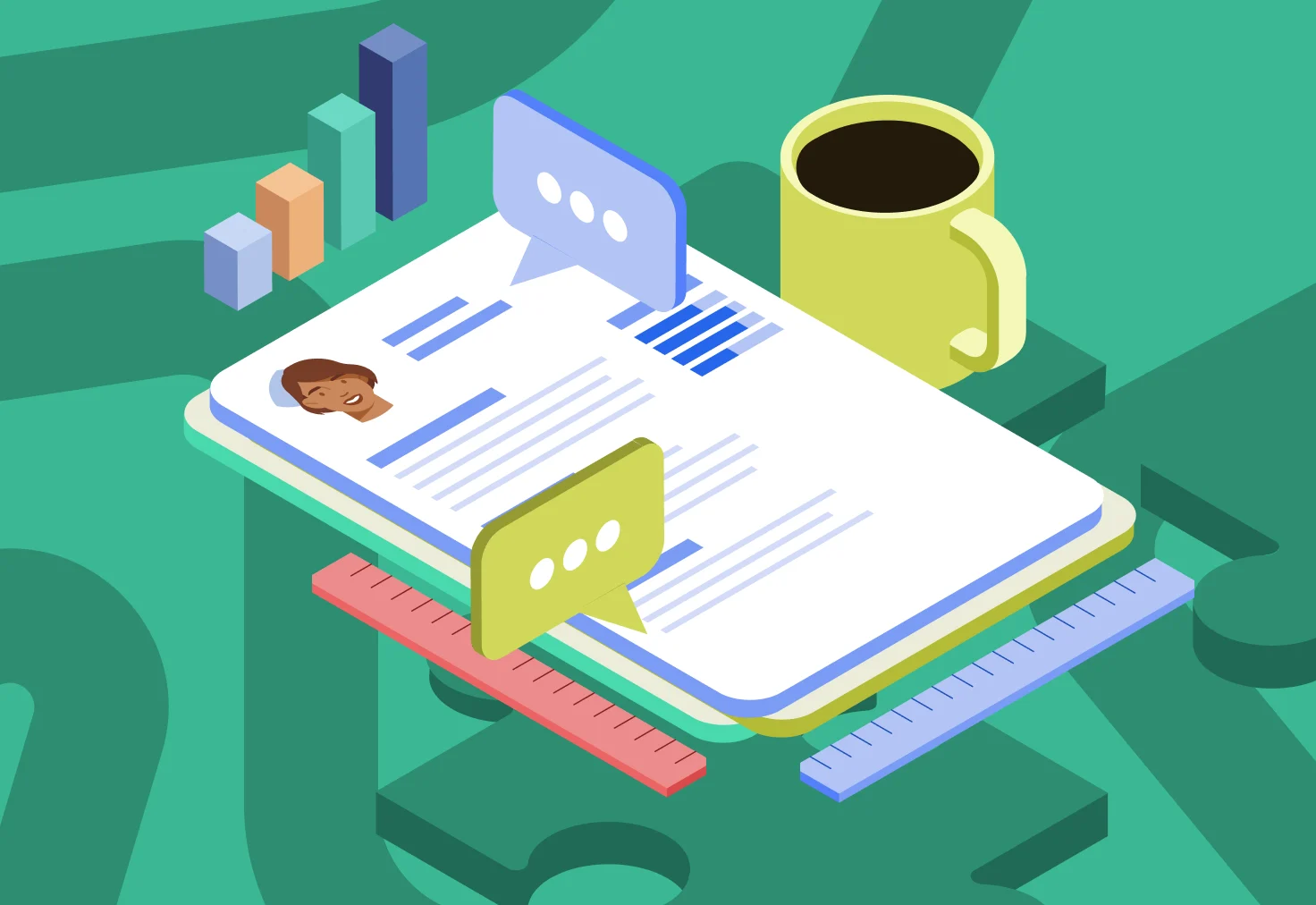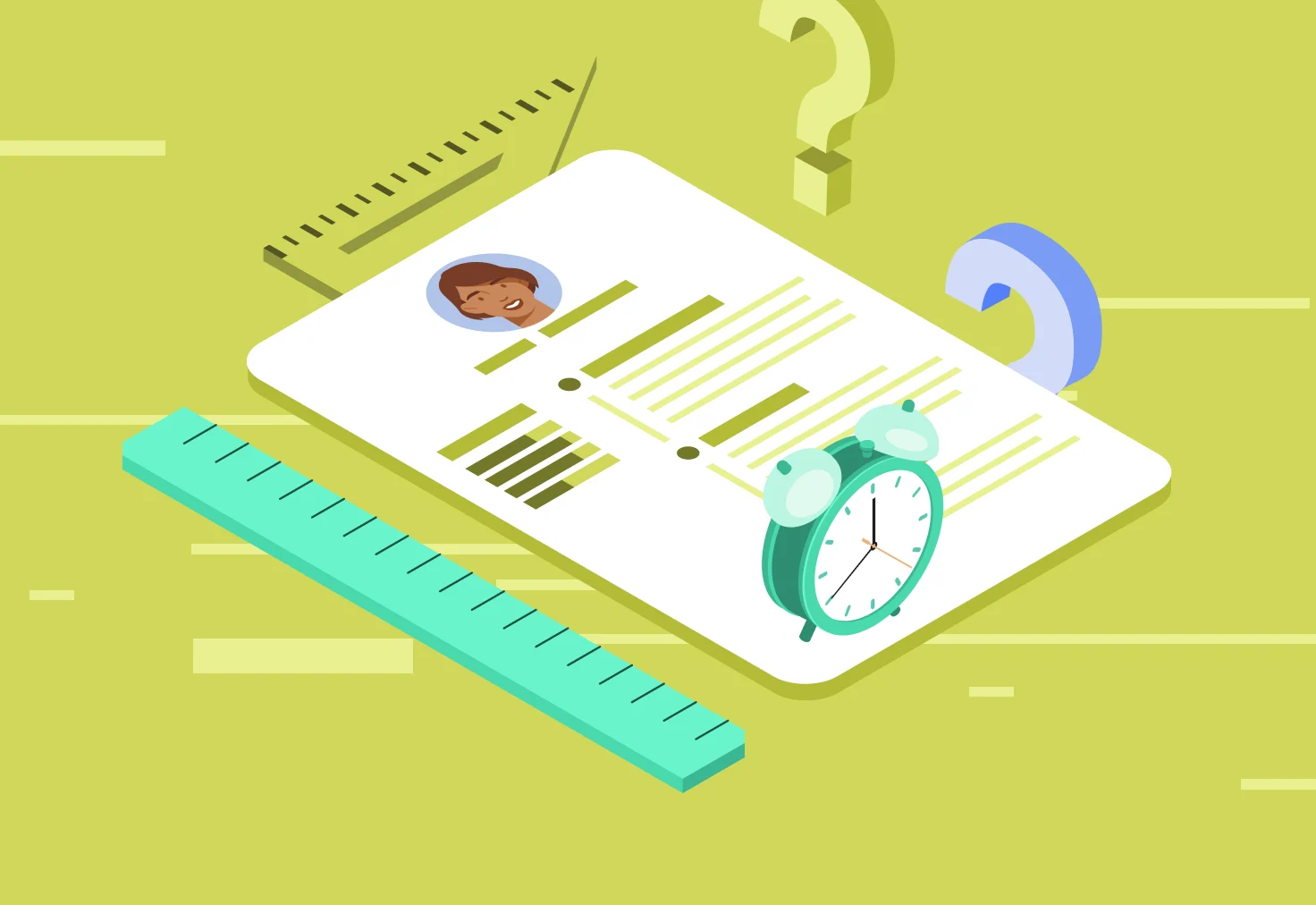What your resume length should be is one of the biggest dilemmas job seekers face. If it’s too short, it might look like you don’t have enough experience. On the other hand, if it’s too long, recruiters may not have time to read the whole thing.
And, while some experts say a resume should never exceed one page, others say two pages is completely fine.
So, how long should a resume be? Is it one page or two? Can it ever be more than that?
Let’s solve this dilemma for good! This guide contains everything you need to know about the ideal resume length. Let’s get started!
Key Takeaways
Ideally, your resume should be one page long, regardless of how much work experience you have.
If you have less than 5 years of experience, your resume should never exceed one page, and if you have 5+ years of experience, it can be up to 2 pages.
To fit a resume on one page, you should include only relevant experience, remove graphics and photos, use action verbs, and use simple language.
In Europe, a CV is the same as a resume, so ideally it shouldn’t be longer than one page.
In the U.S. a CV is used for jobs in academia and has no page limit.
How Long Should a Resume Be?

If you've done any research on resume writing best practices, you've probably read that a resume must fit on a single page. Naturally, you may be wondering if it can ever exceed the one-page limit, and if so, when.
Contrary to popular belief, your resume doesn’t necessarily need to fit on one page if you have 5+ years of work experience—it can go up to two pages (never more).
Still, we don’t recommend it. And frankly, in most cases, your resume will easily fit onto a single page as long as you only mention information that’s relevant to the position.
The reality is that hiring managers typically spend an average of 7.4 seconds reviewing a resume before determining whether to proceed further with a candidate. For this reason, a single-page resume is the way to go.
So, the best answer to the “how long should a resume be” question is this: brief and concise but still long enough to show your worth.
The table below gives a brief overview of the most common questions and answers related to resume length. We’ll cover them in more detail later in the article.
Resume Length Questions & Answers
Question #1: How long should a resume be? Answer: 1 page for most job seekers
Question #2: How many pages should a resume have? Answer: 1–2 pages (depending on your previous work experience)
Question #3: Can a resume have more than two pages? Answer: No (2 pages is the maximum)
Question #4: How far back should a resume go? Answer: As far back as 15 years
Question #5: How long should a CV be? Answer: 2-3 pages for most applicants
Question #6: Can CV have more than 3 pages? Answer: Yes, it has no length limit
How Far Back Should a Resume Go?
The work experience section is one of the key components of a job-landing resume. Yet, it doesn’t mean that you should list everything you’ve ever worked on in it.
While many employers require five years of relevant experience, most career coaches agree that you should focus on the past 10 to 15 years (unless the job ad states otherwise). In most cases, the hiring manager won’t be interested in anything before that, except if:
Exceptions
You’re making a career change or applying for a job in a field in which the only relevant experience you have dates back to more than 15 years ago
You did something so remarkable over 15 years ago that you’re certain will impress the hiring manager even today
In other words, unless you founded Netflix or don’t have more recent relevant work experience, your resume shouldn’t go back further than 10–15 years.
How many years of work experience you should list on your resume also depends on factors such as your general qualifications and how relevant they are to the job you’re applying for. Essentially, when deciding whether to mention a specific role you held in the past on your resume, you should ask yourself whether it's relevant to the job you’re chasing.
Ultimately, if you have years upon years of work experience, you don’t want to stuff all of it on your resume. It won’t do you any favors, whereas tailoring your resume to the job by only mentioning relevant information can help you convince the hiring manager that you'd be a good fit for the role.
Should Resumes Be One Page?
A good resume should be no longer than one page. This is especially true if you’re a college student who doesn’t have any work experience or a professional with a few years of experience.
The reason behind this unwritten rule is the limited amount of time hiring managers have to review your resume. Due to this, you want to organize your resume so that it’s easy to follow and clearly presents the most relevant information. And, if you do this, your resume will most likely fit on one page.
What if you’re applying for a senior position and have many years of relevant experience that translates to more than one page? Are recruiters willing to consider it? The straightforward answer is "yes." However, you shouldn't go over two pages.
How Many Pages Should a Resume Be?

As previously stated, a one-page resume will give you enough space to showcase your summary of qualifications without wasting too much of the recruiters’ time.
If you have more than ten years of experience in your field, you can create a two-page resume that covers all the relevant experience, skills, and qualifications you have. Still, keep in mind that this isn’t the most optimal option.
What matters most when it comes to the length of your resume is that all the information you include is relevant and concise. If those two pages are jam-packed with irrelevant information, this might be off-putting and increase the probability of your application being rejected.
How Long Should a Resume for a Professional Be?
Whether you’re a professional with 2 or 20 years of work experience, your resume should—ideally—be one page long.
However, if you have a ton of relevant work experience that just won’t fit onto a single page, you can go with a two-page resume. Nonetheless, don’t ever go over 2 pages—a good resume is all about quality over quantity.
How Long Should a Student Resume Be?
If you’re a student, you probably have little to no work experience. This means that your no experience resume should never be longer than one page, as any information you would include on page two is probably irrelevant.
How Long Should A Resume Be For a College Student?
The answer is similar to the one related to student resumes—anything longer than one page is too much.
Listing every single extracurricular activity or student job (especially the ones that have nothing in common with the job you’re applying for) won’t help. Instead, you should focus on your most impressive skills, academic achievements, roles in student organizations, internships, and volunteering experiences.
Resume Length for Your Experience Level

If you still aren’t sure how many pages your resume should have, don’t despair. Here’s a small but useful cheat sheet you can use to solve this dilemma:
Resume Length Cheat Sheet
Entry-level or recent graduate 1-page max
Up to 5 years of experience 1-page max
5–15 years of experience Up to 2 pages, but not recommended
15+ years of experience Up to 2 pages max, but not recommended
How to Fit a Resume on One Page [9 Tips]
Since most recruiters prefer one-page resumes, here are a few tips on how to make your resume fit on a single page:
Tip #1. Tailor Your Resume to Each Application
Every job you apply for will have different requirements. So, before you submit an application for a new job position, you should update your resume (and cover letter) to show that you meet the company’s requirements.
To tailor your resume to a particular position, read the job listing carefully and determine the exact qualifications the employer is looking for. Once you do that, you should see which of them you possess and include them in your resume.
Besides helping your resume fit on one page, tailoring your resume can make you appear perfectly suited for the position. Not to mention, by including keywords from the job listing, you also increase your chances of passing the ATS scan.
Tip #2. Include Only Relevant Work Experience
If your professional path has been inconsistent, try to downplay (or leave out) any roles that aren't relevant to a particular job. It's a common misconception that your resume must list every employer you've worked for or position you've held—doing so won't really help you. Unimportant information could distract recruiters from more recent or relevant information.
Also, if possible, consider including 2–3 bullet points of quantified achievements for each position you’ve held. This works much better than listing every single one of your job responsibilities—recruiters already know what the job entails, they want to know how well you did it.
For example, “Cut material costs by 10%” always beats “In charge of material management.”
Tip #3. Remove Graphics and Photos
Photos, logos, and visuals don't belong on your resume. If you're applying for a job online, make sure you remove all of them (in case you have them, of course). Such details can confuse the applicant tracking system (ATS), so you should save them for your LinkedIn profile or portfolio.
Tip #4. Combine Multiple Bullet Points Into One
If you have multiple similar bullet points under the same work experience entry, you can simply merge them into one to save space.
For example, you can substitute this:
Incorrect Example
Ensured our marketing had a positive return on investments.
Used different marketing tools to ensure a maximum return on investments.
Managed the marketing team to ensure that projects were carried out smoothly and effectively.
With this:
Correct Example
Managed a marketing campaign to achieve a 170% return on investments.
Tip #5. Remove the ‘References’ Section
Don’t list your references in your resume or include a line such as “references available upon request.”
Instead, make a separate document with your references and provide it when asked. A hiring manager won’t need your references at this stage of the hiring process. What you want to achieve with your resume is to get invited for an interview.
Tip #6. Think About Removing the “Hobbies and Interests” Section
Listing a few of your hobbies and interests can help you stand out from the crowd, but it’s not mandatory.
If you don’t have any hobbies or interests that you feel strongly about, just remove this section from your resume. Also, steer clear of mentioning any interests or hobbies with a political or religious affiliation.
Tip #7. Effectively Format Your Resume
If you use a large font and wide margins in your resume, you’re probably going to find it difficult to fit all the required information on a single page.
What you should do first is modify your resume format by trying different margins ranging from 0.5 to 1 inch. The idea is to make sure the text is evenly distributed on the page. One-inch margins are typically suitable for resumes with less text, while smaller 0.75 or 0.5 margins work best for resumes with more text.
Regarding the best font size, don’t go under 10 pt. Otherwise, your resume may become unreadable.
Tip #8. Use Action Verbs
By using action verbs in your resume, you can effectively save space by eliminating overused phrases such as “responsible for” and “in charge of.” So, instead of “Responsible for managing a team of 10 customer support representatives,” simply say “Managed a team of 10 customer support representatives.”
This also helps you avoid repetition and shows that you are a self-starter. Moreover, your experience looks more real and effective, and your story comes across as more concise and powerful.
Tip #9. Simplify Your Language
Lastly, go through your resume several times to see if you can simplify your language.
Whenever possible, remove filler adverbs (e.g., “very” and “extremely”) and certain determiners (e.g., “that,” “the," “a,” or “an”) to make your sentences shorter and easier to read.
How Long Should a CV Be?
To answer how long a CV should be, we first need to clear up the confusion around what a CV actually is. In fact, there are two definitions, depending on where you’re applying for a job:
In Europe, CV (Curriculum Vitae) is simply another word for a resume. So, if you’re applying for a job in a European country, you’ll be asked to provide your CV—and not your resume—to the hiring manager.
In the United States, a CV is used for academic purposes only. You’ll be asked to provide a CV in the U.S. if you’re applying for a job in academia, e.g., you want to land a job as a college professor.
So, how long should a CV be? Here’s the answer:
If you’re applying for a job in Europe, the ideal length of a CV is the same as that of a resume—one page long. Keep in mind that resume length exceptions apply to CV length too, as they’re basically the same document. So, you can technicallywrite a two-page CV if you’re a seasoned professional, but it’s still not recommended.
If you’re applying for an academic job in the U.S., your CV should contain a full history of your academic credentials. As such, there’s no limit to how long a CV can be—it needs to contain all of your publications, teaching experience, and conferences, among other academic achievements and relevant information.


